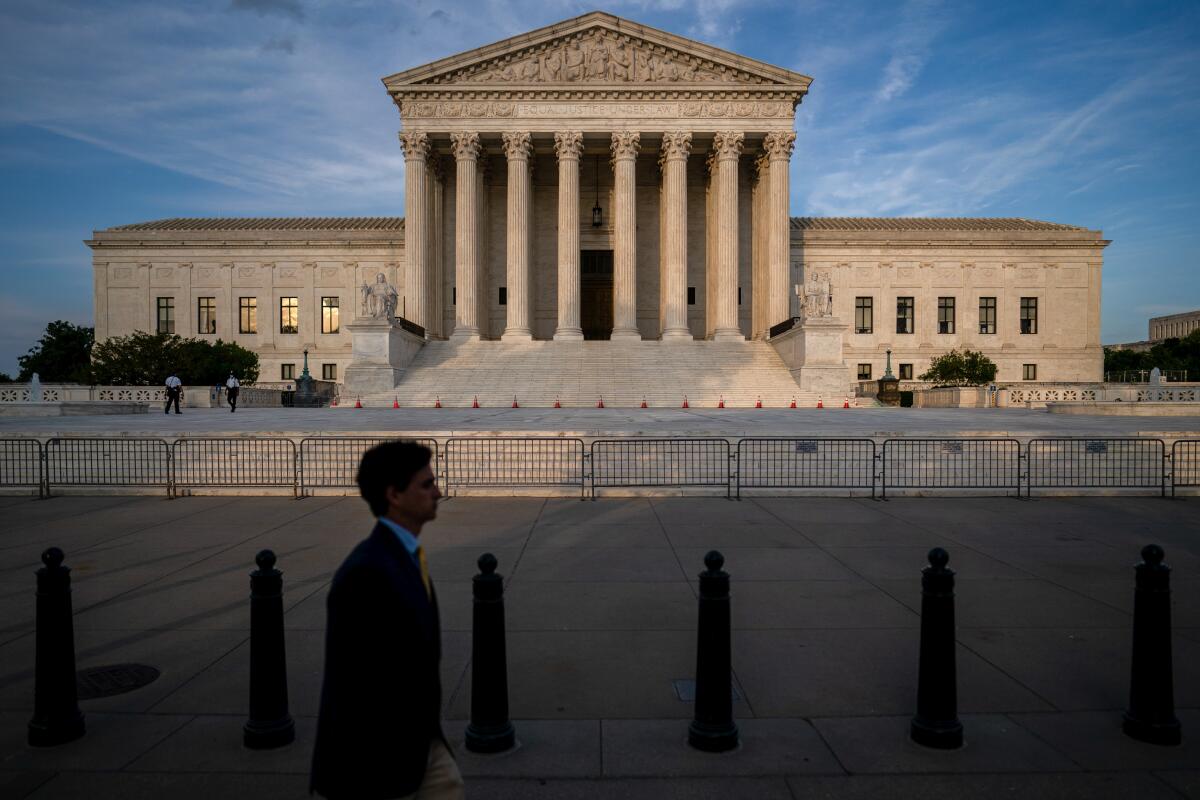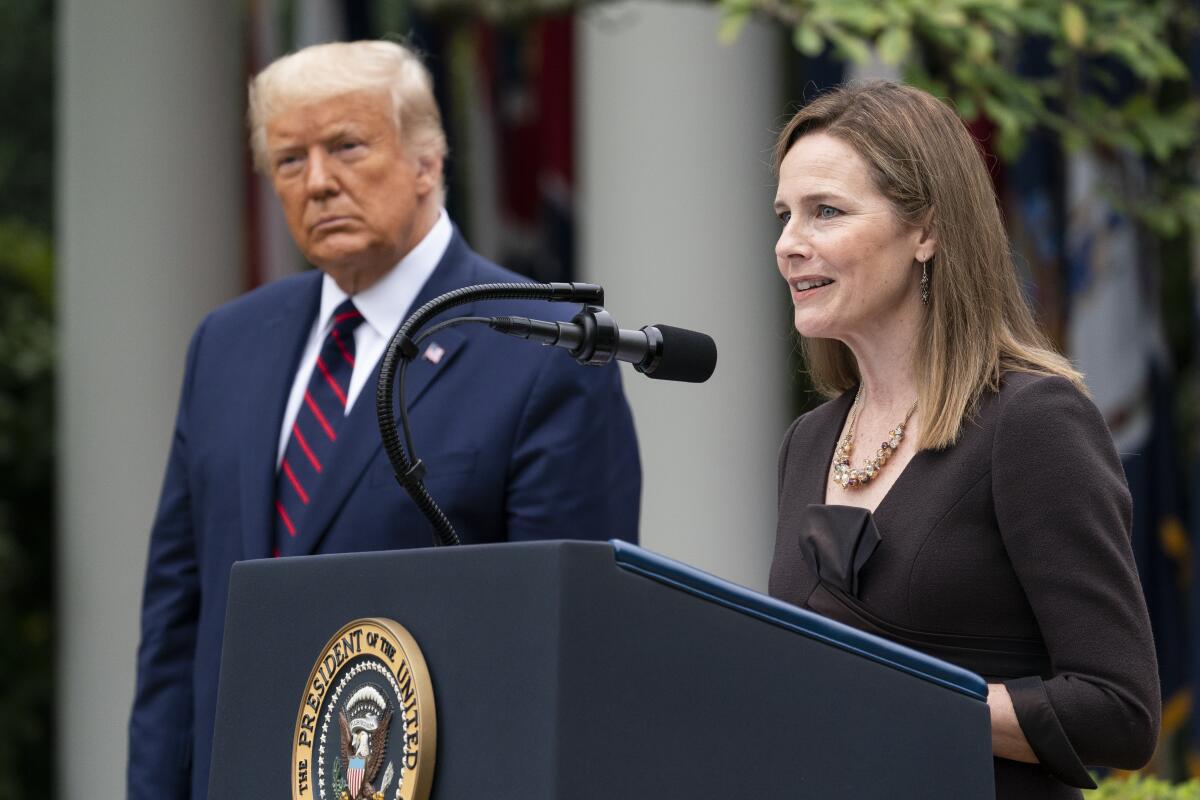Essential Politics: What history tells us about race, gender and Biden’s court pick

In its 232-year history, the Supreme Court has had 115 justices.
Five have been women, all but three have been white, and only one in recent history has been asked who does the laundry at her home.
Justice Amy Coney Barrett, the mother of seven, was asked by Sen. John Kennedy (R-La.) about the family’s laundry routine during her 2020 confirmation hearing. The moment, which sparked a backlash over whether a man would be asked a similar question, highlighted the stereotypes and gendered norms still at play in the confirmation process.
The upcoming debate over President Biden‘s pick — the first Black woman to be nominated — has already proved to be contentious now that both race and gender will be factors. Much of the focus so far has centered on whether the nominee will be qualified or a “lesser” candidate, whether she is an affirmative action pick and whether the president should consider “all possible nominees.”
Welcome to today’s Essential Politics newsletter. I’m Arit John, a national political reporter. As we await Biden’s announcement of who his Supreme Court pick will be, today we’ll take a look at the politics and media coverage surrounding previous female court nominees.
Get our L.A. Times Politics newsletter
The latest news, analysis and insights from our politics team.
You may occasionally receive promotional content from the Los Angeles Times.
Lessons from past media coverage
Female nominees’ gender and sexuality were mentioned more often than male judges, according to a 2012 study by law professors Renee Knake Jefferson and Hannah Brenner Johnson. At times, those mentions highlighted and celebrated the achievements. In other cases, they distracted from judges’ qualifications and “perpetuate[d] stereotypes and token status,” the two wrote.
Jefferson, who along with Johnson co-wrote 2020’s “Shortlisted: Women in the Shadows of the Supreme Court,” about the history of women considered for the high court, says she doesn’t blame the media.
“I find using the media’s coverage in moments like this [a] tool to have really difficult conversations with people and cause them to reflect on how they perpetuate these stereotypes in their own way,” she told The Times.
A lot of the early coverage this time has echoed reporting on past female nominees to the court, especially when it came to Justice Sonia Sotomayor, the court’s first woman of color.
Jefferson and Johnson note that Sotomayor (and President Obama, who nominated her) drew negative press coverage for a 2001 speech in which she said she “would hope that a wise Latina woman with the richness of her experiences would more often than not reach a better conclusion than a white male who hasn’t lived that life.”
Justice Samuel A. Alito Jr., who is of Italian descent, did not receive similar bad press when he said during his 2006 confirmation hearing that he took into account the discrimination his relatives faced during immigration cases. “I can’t help but think of my own ancestors,” he said.
As with her predecessors, Biden’s nominee will likely be grilled over any comments she made in the past about how her race and gender have shaped her worldview.
Both Sotomayor and Obama’s other appointee to the court, Justice Elena Kagan, were also single women without children, a status led to media reports and questions about their personal lives and their sexuality, including whether “mothers” were losing representation on the court.
“It’s because the public had never seen a Supreme Court justice who was a female, who was anything other than also a very traditional, white, married with children [woman],” said Jefferson. “And of course, we know that women come in many, many other versions than that.”
A decade passed before another woman was nominated to the Supreme Court. Barrett’s nomination saw a return to stereotypes about women’s value being connected to their role as mothers.
“Barrett was not just a nominee. She was a ‘mominee,’” Julie Cantor wrote in an October 2020 op-ed for the National Law Journal. “Marveling over motherhood was a theme, not a footnote.”
Past media coverage also weighed the potential political peril Republicans — who struggled in many states to win over Black and Latino voters — could face in opposing historic, diverse candidates.
In 2009, the Associated Press reported: “Republicans, at sea as a party and having lost ground with Hispanic voters, the fastest-growing segment of the population, will have a hard time defeating the woman who would be the first Hispanic justice.”
This month, Carl Hulse at the New York Times wrote: “Republicans are weighing whether to wage all-out war or take a more tempered approach against Mr. Biden’s pick. … Many of them recognize that a divisive fight could provide more fodder for Democrats to try to deepen the wedge between their party and African Americans before this year’s midterm elections.”

Our daily news podcast
If you’re a fan of this newsletter, you’ll love our daily podcast “The Times,” hosted every weekday by columnist Gustavo Arellano, along with reporters from across our newsroom. Go beyond the headlines. Download and listen on our App, subscribe on Apple Podcasts and follow on Spotify.
Politics of the court
Some Republicans have criticized Biden over the way he announced his Supreme Court criteria, arguing that he should consider all potential nominees. But supporters of Biden’s decision have noted that presidential nominations are inherently political. Candidates must be qualified, but presidents also screen for age, ideological bent and how the pick could energize their bases or protect them from political criticism.
President Trump promised to replace Justice Ruth Bader Ginsburg with a woman a day after her death, part of an effort to address his own history of accusations of sexism, assault and harassment as he sought someone who seemed poised to vote to overturn Roe vs. Wade.
As press coverage has noted, political pressure on Biden to nominate a Black woman to the court stemmed from several directions: the desire to acknowledge that Black women were the most consistent members of the base that propelled him to the nomination; encouragement from Democratic Rep. James E. Clyburn of South Carolina, whose endorsement in the state helped revive Biden’s campaign; and a need to insulate himself from his treatment of Anita Hill, who accused Justice Clarence Thomas of sexual harassment during the 1991 confirmation hearings Biden oversaw.
President Reagan, facing criticism over opposition to the proposed Equal Rights Amendment and his appointment of mostly white men to the state Supreme Court as California governor, also promised to nominate the first woman to the court while on the campaign trail.
Reagan eventually nominated Justice Sandra Day O’Connor. But there was also a Black woman on his shortlist.
Amalya Kearse has been a judge on the 2nd Circuit Court of Appeals since 1979, when she was appointed by President Carter. Kearse was also on President Clinton’s shortlist — that spot eventually went to Justice Stephen G. Breyer.
“The very seat that Breyer will now leave could have — I would argue should have — gone to Amalya Kearse, a Black woman,” said Jefferson. “Now, finally, in his retirement, it will.”
More on Biden’s court pick
— “Ketanji Jackson is a favorite for Biden’s historic Supreme Court pick” by David G. Savage
— “California’s Leondra Kruger emerges as contender for U.S. Supreme Court” by Hannah Wiley
— “Supreme Court vacancy offers Biden, Democrats a chance to energize voters after setbacks” by Eli Stokols, Jennifer Haberkorn and Melanie Mason
Enjoying this newsletter? Consider subscribing to the Los Angeles Times
Your support helps us deliver the news that matters most. Become a subscriber.
The view from Washington
— Vice President Kamala Harris is adjusting her strategy after a rough first year in office, hiring new staffers and looking for ways to get her out on the road promoting the administration’s agenda. But allies say it’s not a reboot. “I’d call it chapter two,” Harris supporter the Rev. Leah Daughtry tells Noah Bierman.
— Doug Emhoff, the husband of Vice President Harris, was evacuated from a Washington high school Tuesday afternoon after a reported bomb threat, Erin B. Logan and Noah Bierman report. The second gentleman was visiting Dunbar High School for a Black History Month event.
— Former President Trump has endorsed three candidates in secretary of state races this fall, elevating those who have spread his false claim of widespread fraud in the 2020 election. I wrote about the attention and money pouring into the secretary of state races, with a focus on Michigan, where incumbent Secretary Jocelyn Benson will likely face off against Kristina Karamo, an adjunct community college professor whom Trump endorsed last year.
The view from California
— The latest effort to pass a single-payer healthcare system died in the California Assembly without a vote last week. But, as Taryn Luna and Melody Gutierrez report, the debate over government-sponsored universal healthcare isn’t ending anytime soon.
— Gov. Gavin Newsom deserves both praise and criticism for his efforts to shut down death row, argues columnist George Skelton. Specifically, the governor deserves credit for “having the guts to follow his conscience,” Skelton writes, but criticism for disobeying the wishes of California voters, who have repeatedly backed the death penalty at the ballot box.
— L.A. mayoral candidate and U.S. Rep. Karen Bass released her public safety plan this week, which calls for boosting hiring at the Los Angeles Police Department, a strategy that could put the Democrat at odds with activist groups calling for a redistribution of police funds, reports David Zahniser.
— Downtown business leader Jessica Lall ended her brief mayoral campaign, Julia Wick reports. Lall said Tuesday that she believed the mark of a good leader was being brave enough to step in but also “wise enough to know when to step back.”
Editor’s note: Friday’s edition of this newsletter incorrectly stated NATO’s full name. The acronym stands for North Atlantic Treaty Organization.
Stay in touch
Keep up with breaking news on our Politics page. And are you following us on Twitter at @latimespolitics?
Did someone forward you this? Sign up here to get Essential Politics in your inbox.
Until next time, send your comments, suggestions and news tips to [email protected].
Get the L.A. Times Politics newsletter
Deeply reported insights into legislation, politics and policy from Sacramento, Washington and beyond. In your inbox three times per week.
You may occasionally receive promotional content from the Los Angeles Times.




